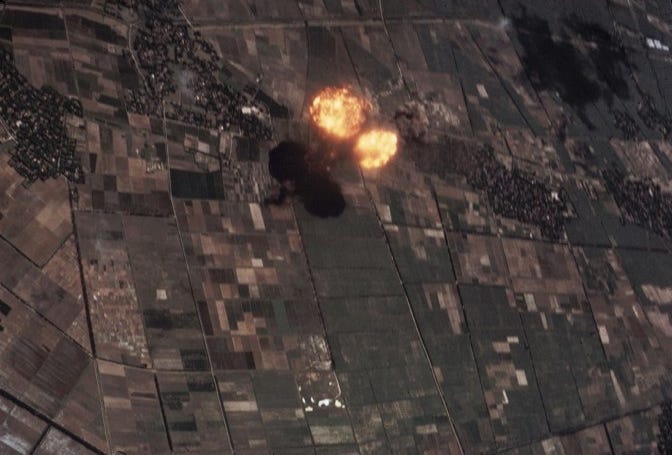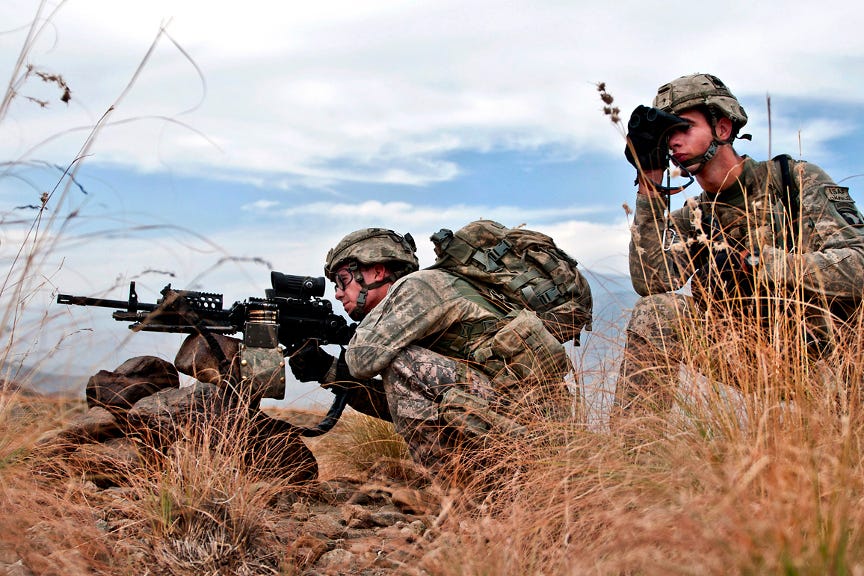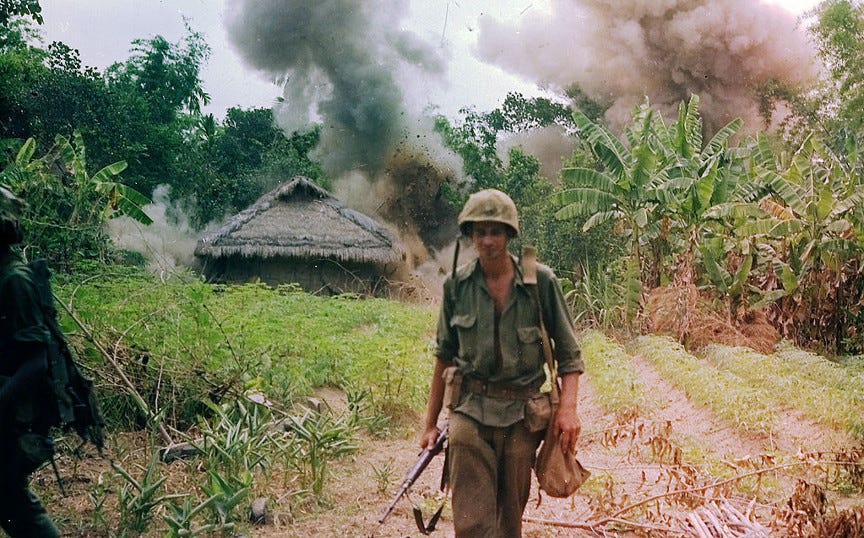America's long Vietnam: The diminishing utility of war.
Since the end of Vietnam, what war is really good for, at least in American history, is a difficult question to answer.
Forty-nine years ago today, on August 11, 1972, the last American ground combat unit left South Vietnam. The Vietnam War was by no means over--especially for the Vietnamese--but the withdrawal was part of the United States's long retreat from that troubled conflict, which culminated with the removal of all U.S. military forces in January 1973. By then the United States had been heavily involved in fighting in Vietnam for nearly eight years with major ground troops, and several years more before that with "advisers" designed to prop up the South Vietnamese regime against unification (by force) with the Communist North. Nearly 50 years on there's no credible argument left that the U.S. did not lose the Vietnam War. (Incidentally, I teach an online class on the history of the Vietnam War). What's interesting, though, is America's experience with war as a policy tool in the years since 1973, and how one could make an argument that, at least for Americans, war just isn't what it used to be. This requires taking a long view of history, but I think it's a worthwhile subject to explore.
Since the end of Vietnam the U.S. has intervened militarily in a large number of places around the world, from Grenada to Somalia, but there have really been three major conflicts that can really be called full-scale wars as most people understand them: the Persian Gulf War of 1991, the conflict in Afghanistan that began in 2001 and the Iraq War of 2003. Our record in these conflicts is mixed. The Gulf War of 1991 clearly was an unequivocal military victory, at least insofar as its express objective which was to get Saddam Hussein to relinquish Kuwait which Iraq had invaded. Yet even this victory resulted in "unfinished business" that played heavily into the 2003 war. Osama bin Laden, the mastermind of the 9/11 attacks, was killed by American troops in 2011, but the broader result of the Afghan conflict seems much more ambiguous, politically and morally. In all of these cases serious questions remain as to what we really accomplished and if it was worth it.

Contrast this with the previous historical experience of America's wars. The Revolutionary War of 1775-83 was quite effective, militarily and politically, at establishing the U.S. as an independent country; the War of 1812, though militarily a draw, at least had the unquestioned result of cementing the status of American independence and "finishing" the Revolution. The Mexican War of 1846-48 was largely a land-grab, but at least it was successful. World War I and the Spanish-American War ended with the enemy government suing for peace after either decisive defeat on the battlefield, or the realization that such defeat was inevitable. The Civil War and World War II were America's most "successful" wars: both ended with basically total victory, the total disintegration of enemy governments and the enemy's territory occupied by the troops of the winning side. This is not a moral analysis in any way--just a utilitarian one. Did we accomplish the objectives that we sought in entering the war in the first place? Was the war "useful" in that sense? I think the answer here is yes.
Why has war become "broken" as a policy tool, at least for the United States? I think there are a number of reasons. One of them is the enemies we have chosen to fight since World War II: in Vietnam we were resisting a national unification that was broadly popular among the Vietnamese people; in Iraq we were facing an insurgency without centralized leadership; in Afghanistan we've been fighting terrorists and trying to stabilize a weak government. America has never been good at guerrilla wars. Take the experience of the horrifying Philippine War of 1899-1902, which resembles Iraq more than any other conflict we've been involved in. If we're fighting a national government that has direct control over its people and armies, like Nazi Germany or the Confederacy, our style of warfare works to our advantage. But beyond that situation, we're largely out of our depth.

The nature of warfare has also changed since the 19th and early 20th centuries. The advent of nuclear weapons in 1945 was a game-changer in every area of geopolitics and military strategy. Nuclear weapons do not, I think, take the possibility of another global conflict off the table, and there's no guarantee that such a conflict would not be a conventional one as the previous world wars are, but it's clear the threat of nuclear escalation has changed the analysis of nation states when considering war and peace decisions. Another factor that changes the nature of war for the United States is the abolition of the draft in 1973, a direct result of Vietnam. Our armed forces are arguably better as an all-volunteer force, but the flip side is that they are no longer broadly representative of our society at large. That has both positive and negative effects on decisions about whether or not to use force.
Unfortunately, the diminishing utility of war as a policy tool doesn't seem to have sunk in to political leaders to the degree it should. The eagerness with which the George W. Bush administration went to war in Iraq raises disturbing questions about whether policymakers really understand what wars are, what they mean and what they're supposed to accomplish. In 2016, when he was first running for President, Donald Trump spoke blithely of defeating Daesh (ISIS) through military means—a conflict that would probably take 20 years and cost millions of lives—as if all that's required to make a war successful is willpower. Until we recognize the limitations of military force as a means to achieve political objectives, I fear there may be more Vietnams, Iraqs and Afghanistans in our national future.
All images in this article are in the public domain.
☕ If you enjoy what I do, buy me a virtual coffee from time-to-time to support my work. I know it seems small, but it truly helps.
🎓 Like learning? Find out what courses I’m currently offering at my website.
📽 More the visual type? Here is my YouTube channel with tons of free history videos.
💌 Feedback to share or want to say hello? Hit reply on this email or leave me a comment on Substack.




